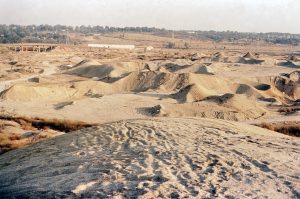
The latest energy funding from the Biden administration’s Environmental Protection Agency includes more than $1 billion in a third and final wave for cleanup projects at more than 100 Superfund sites across the country.
One of the projects is a mining site in southeast Kansas and adjacent to the Tar Creek Superfund site in northeast Oklahoma. Tar Creek was cited decades ago and involved the removal of one town. It is an ongoing cleanup.
Just across the state line near the Kansas town of Galena, the Cherokee County Superfund site is one of 25 newly identified sites. It is part of the Tri-State Mining District that included northeast Oklahoma and covers 115 square miles of land where there was widespread lead and zining mining and the mountains of mine tailings left behind. The tailings cover 4,000 acres and have contaminated groundwater with lead, zinc and cadmium.

It is the same kind of pollution that plagues northeast Oklahoma near the former town of Picher which was abandoned in 2013. Towns and cities such as Picher and Galena were the sites of more than 100 years of mining in the region and as a result, miillions of cubic yards of mine tailings are present at the surface in addition to impacted soils, surface water, sediments and the groundwater.
The additional $1 billion in funding includes continued financing of cleanup at 85 Superfund sites across the country.
“After three rounds of investments, EPA is delivering on President Biden’s full promise to invest in cleaning up America’s most contaminated Superfund sites,” said EPA Deputy Administrator Janet McCabe. “This final round of Bipartisan Infrastructure Law funding has made it possible for EPA to initiate clean ups at every single Superfund site where construction work is ready to begin. This is an incredible milestone in our efforts to clean up and protect communities, deliver local jobs, enhance economic activity, and improve people’s lives for years to come.”




